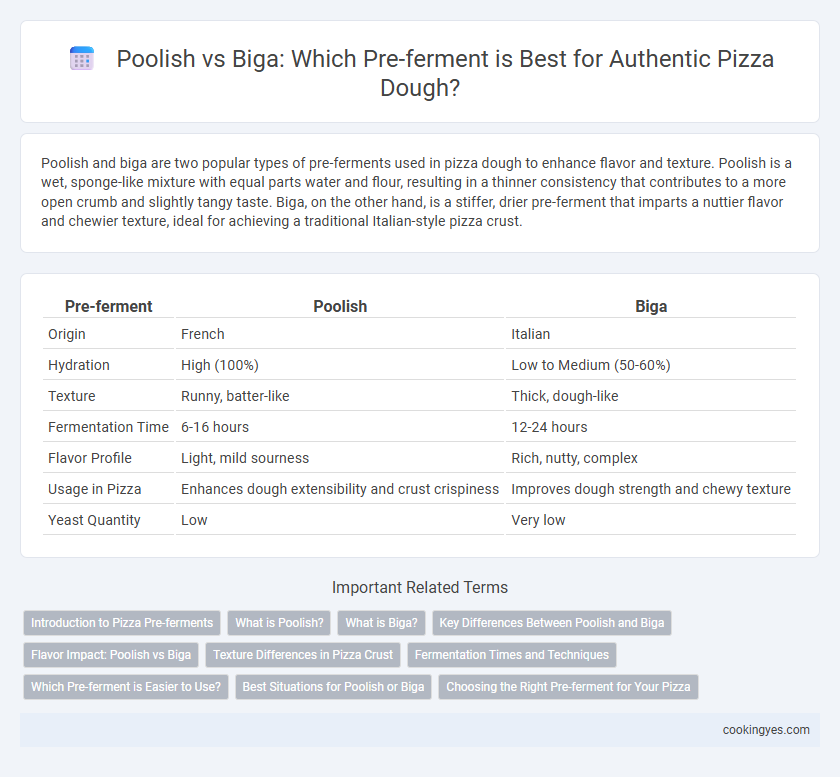Poolish and biga are two popular types of pre-ferments used in pizza dough to enhance flavor and texture. Poolish is a wet, sponge-like mixture with equal parts water and flour, resulting in a thinner consistency that contributes to a more open crumb and slightly tangy taste. Biga, on the other hand, is a stiffer, drier pre-ferment that imparts a nuttier flavor and chewier texture, ideal for achieving a traditional Italian-style pizza crust.
Table of Comparison
| Pre-ferment | Poolish | Biga |
|---|---|---|
| Origin | French | Italian |
| Hydration | High (100%) | Low to Medium (50-60%) |
| Texture | Runny, batter-like | Thick, dough-like |
| Fermentation Time | 6-16 hours | 12-24 hours |
| Flavor Profile | Light, mild sourness | Rich, nutty, complex |
| Usage in Pizza | Enhances dough extensibility and crust crispiness | Improves dough strength and chewy texture |
| Yeast Quantity | Low | Very low |
Introduction to Pizza Pre-ferments
Pizza pre-ferments like Poolish and Biga enhance dough flavor and texture through controlled fermentation before mixing. Poolish is a wet pre-ferment with equal water and flour, promoting extensibility and a lighter crumb. Biga is a stiffer, drier pre-ferment that develops gluten strength and a more complex, nutty flavor in traditional Italian pizza crusts.
What is Poolish?
Poolish is a wet, sponge-like pre-ferment made from equal parts flour and water with a small amount of yeast, used in pizza dough to enhance flavor and improve texture. It allows for extended fermentation time, resulting in a more flavorful crust with better crumb structure and chewiness. Compared to biga, poolish has higher hydration, making it easier to mix and creating a softer dough ideal for artisanal pizza.
What is Biga?
Biga is an Italian pre-ferment used in pizza dough that consists of flour, water, and a small amount of yeast, creating a firm and dry mixture. This pre-ferment enhances flavor development, improves dough structure, and extends shelf life by allowing longer fermentation times. Compared to Poolish, Biga typically has lower hydration, resulting in a denser texture ideal for traditional Neapolitan-style pizza crusts.
Key Differences Between Poolish and Biga
Poolish is a wet pre-ferment with a 100% hydration level, creating a batter-like consistency that promotes faster fermentation and enhances the dough's extensibility, ideal for airy pizza crusts. Biga is a stiff pre-ferment with approximately 50-60% hydration, resulting in a dense, dough-like texture that develops stronger gluten structure and adds a nutty flavor to the pizza. Key differences include hydration level, fermentation time, and the impact on dough elasticity, flavor complexity, and crust texture, making Poolish better for light, open crumb pizzas and Biga suited for chewier, more structured crusts.
Flavor Impact: Poolish vs Biga
Poolish imparts a slightly tangy, mild sourdough flavor to pizza dough due to its higher hydration and shorter fermentation, enhancing crust lightness and aroma. Biga offers a nuttier, more complex flavor from its lower hydration and longer fermentation, contributing to a chewier texture and deeper crust color. Both pre-ferments enrich pizza flavor, but Poolish emphasizes brightness while Biga delivers robust, savory notes.
Texture Differences in Pizza Crust
Poolish pre-ferment produces a pizza crust with a lighter, airier texture due to its higher hydration level, resulting in a more open crumb structure and crisp edges. Biga, being stiffer and less hydrated, yields a denser, chewier crust with a slightly nutty flavor and more pronounced gluten development. The choice between poolish and biga directly influences the pizza's mouthfeel, with poolish offering tenderness and biga emphasizing strength and chewiness.
Fermentation Times and Techniques
Poolish typically ferments between 12 to 16 hours at room temperature, producing a wet, bubbly pre-ferment rich in enzymes that enhance dough extensibility and flavor. Biga, an Italian preferment, usually requires a longer fermentation of 16 to 24 hours with a stiffer consistency, contributing to a nuttier taste and a denser crumb structure. The choice between Poolish and Biga affects dough hydration, fermentation speed, and the final pizza crust texture.
Which Pre-ferment is Easier to Use?
Poolish is generally easier to use for pizza pre-ferment due to its higher hydration level, creating a batter-like consistency that is simple to mix and incorporate into dough. Biga, with its lower hydration, forms a stiff dough requiring more force to knead and manage. Home bakers and pizzerias often prefer Poolish for its straightforward preparation and consistent fermentation results.
Best Situations for Poolish or Biga
Poolish, with its higher hydration and loose batter consistency, is ideal for pizza doughs requiring quick fermentation and a light, airy crumb structure, making it perfect for thin-crust styles like Neapolitan. Biga, characterized by lower hydration and a stiff texture, excels in developing a rich, nutty flavor and enhanced gluten strength, which suits thicker, chewier doughs such as Sicilian or focaccia-style pizzas. Choosing Poolish favors faster fermentation and delicate texture, while Biga supports longer fermentation times and robust dough development.
Choosing the Right Pre-ferment for Your Pizza
Poolish offers a wetter, more extensible dough that enhances crust softness and fermentation flavor, ideal for light, airy pizza bases. Biga, with its stiffer consistency, promotes a chewier texture and more structured crumb, making it perfect for traditional Italian-style pizzas. Selecting between Poolish and Biga depends on desired crust texture and flavor complexity in your pizza recipe.
Poolish vs Biga for Pizza Pre-ferment Infographic

 cookingyes.com
cookingyes.com